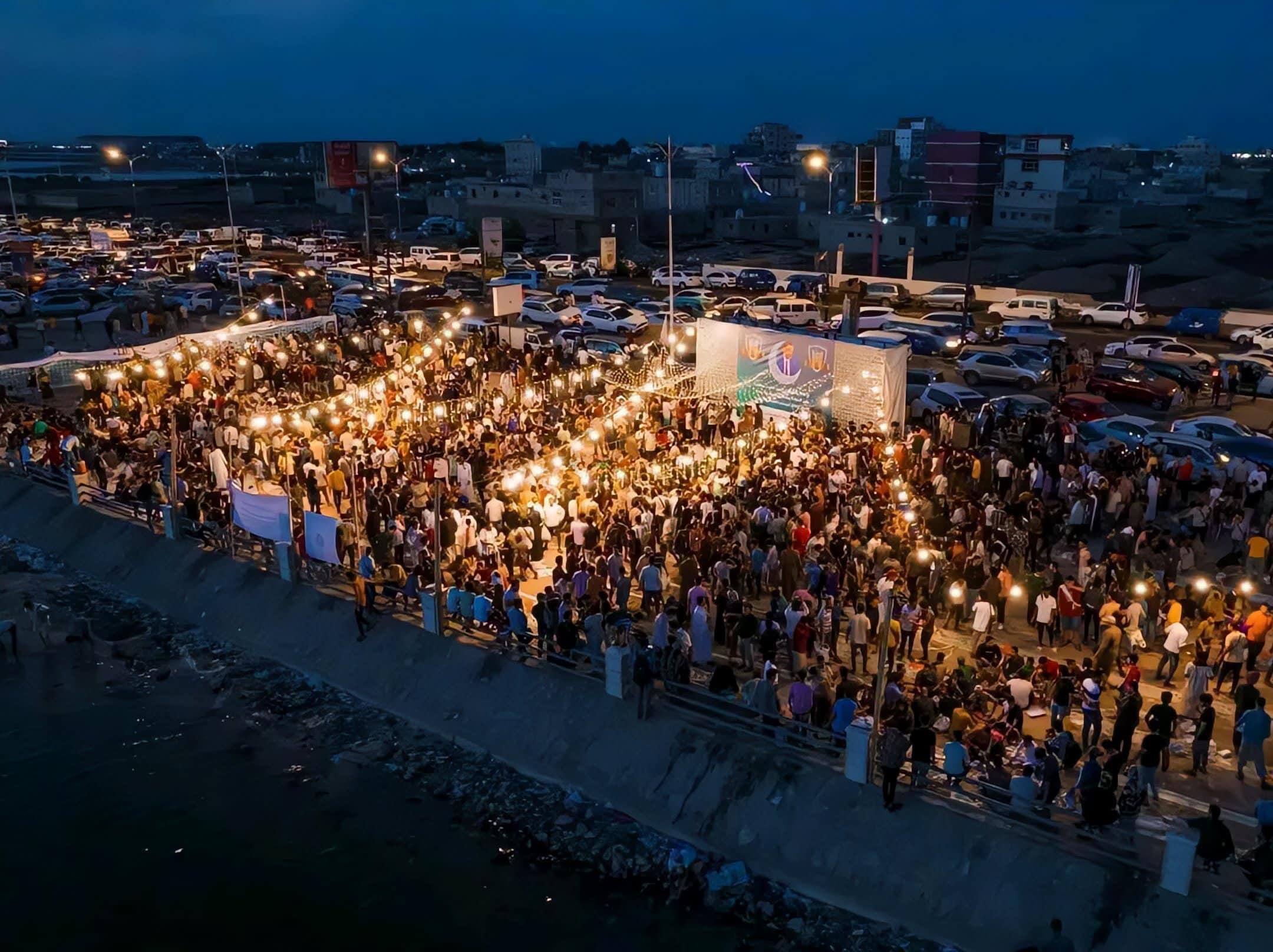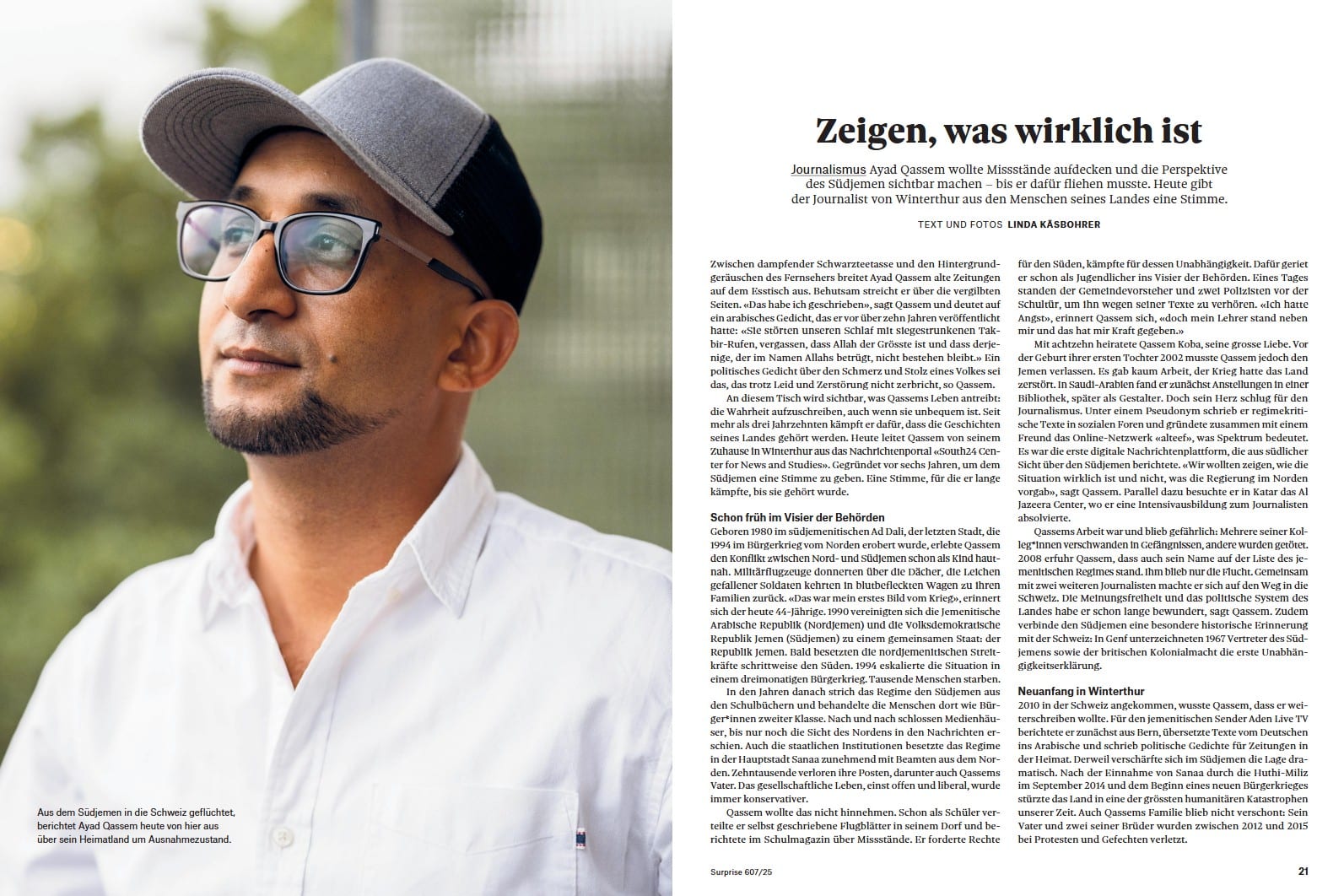
Youth iftar in Aden - Ramadan - April 2023 (Facebook)
آخر تحديث في: 16-01-2024 الساعة 5 مساءً بتوقيت عدن
“The attempts to obliterate the Southern identity for political purposes have created an identity crisis for many young people in South Yemen”.
Abdullatif Salmeen (South24)
Following the years of war in Yemen and the resultant unending hardships and deprivations, big transformations have emerged regarding the needs and priorities of the young people in the country. Most of them are living amid the aspiration of “restoring the state of South Yemen”. This situation is different from the life they previously experienced during the former Yemeni regime.*
Despite young people being required to play an essential and fundamental role in different fields, their participation in the economic, social, and political life of their nation has been beset with difficulties. This report is an attempt by ’South24 Center‘ to explore these challenges and listen to the voices of a select pick of young men and women from different governorates of South Yemen to talk about this issue.
While they may have different views, there is consensus among the youth about the need to make changes that can increase their participation and activities in decision-making, including in politics, the economy, and entrepreneurship as well as enhance the available opportunities.
Although young men and women are considered the momentum for the development of society, in South Yemen the youth face many obstacles that prevent their active participation, including the lack of job opportunities, poverty, and discrimination (by North). Besides, there also exists the different forms of violence, such as domestic and violence against women. Due to the latest Gaza war and its multi-level repercussions, the challenges have become even more complicated.
Aden resident Nour Mohammed, who works as a digital security trainer, told ’South24 Center’ about “the most prominent hardships” she has encountered. According to Nour, the biggest failure is the internet infrastructure in Yemen and the lack of job opportunities in the digital security sector, especially for women.
She elaborated by saying: “I have concerns about the future and the impact of the technological advancement – by way of job losses and changes in society. I think that efforts should be made to find new job opportunities for the youth, improve education, support the small projects and encourage dialogue among young people.”
Waleed Bilal, a young man, believes that the youth in South Yemen face several challenges, including the lack of self-development opportunities and the failure to access proper jobs. Even if they find a job, they will face the problem of how to strike a balance between work and personal life.
He told ’South24 Center‘: “The problems have been further aggravated due to the war.”
Media figure Yunis Al-Sarouri believes the economic challenges are the biggest obstacles for the youth. He told ’South24 Center’: “There is a need to provide job opportunities, encourage local production, and combat immigration abroad. The war has negatively affected the young people at both the living and psychological levels.”
For her part, journalist Abeer Ali told ’South24 Center‘ that “the war and conflict in Yemen have led to a lack of jobs as well as university education opportunities.”
Broadcaster Yaqoub Bamzroua said: “The young people in Al-Mukalla in Hadramout have to contend with hard economic conditions, lack of support, a gap in the labor market, and discrimination. This affects their desire to marry.” He also voiced concerns about the impact of wars on young people. He urged that people need to support the youth and carry out real youth initiatives.
Asmaa Al-Alimi, who resides in Socotra (archipelago near the Gulf of Aden), recounted the challenges faced by young people residing there, including the lack of development, unemployment, and nepotism. Nour Abdulaziz Makki from Al-Mahra (the easternmost governorate in Yemen), who works as Director of Systems and Information Management at the Fisheries Authority, told ’South24 Center‘ that the obstacles related to accessing higher education and the lack of job opportunities for young people are the most prominent current challenges.
Aseel Mohammed, from Al-Dhalea, who is the Chairman of the Youth Forum For Political Development, believes that the latest war has impacted the capabilities and morale of young people and reduced their available opportunities. He told ’South24 Center‘: “There is a lack of awareness, vision, and goals among many young people. This has given rise to several social problems, such as forced alienation and early marriage.”
Dr. Shakib Al-Ahmadi, from Shabwa, said: “Young people face hardships in marriage due to the expensive dowries and the scarce financial resources.” He told ’South24 Center‘: “These social challenges impact young people. There are also other negative phenomena like tribal feuds and others that deplete their capabilities and energies.”
Political challenges
In general, young people in South Yemen believe that their participation in political life and decision-making is weak and doesn’t measure up to the required level. Aseel Mohammed said: “Young people in South Yemen lack awareness about the importance of political participation. This is in parallel to their intentional alienation.” As a result, the young people of North Yemen have seized the opportunities that southerners were entitled to, according to him.
Nour Mohammed explained that young people in South Yemen have been deprived of opportunities and training courses that can prepare them ultimately for participation in the political life. Yaqoub Bamzroua believes that “political parties prefer controlling the decision-making instead of supporting young people to access proper decision-making opportunities. I feel like that when I try to travel from one area to another domestically”.
Shakib Al-Ahmadi agrees that the political parties have played a negative role in the case of young people. He explained: “For example, in my governorate, Shabwa, some young people are affiliated with political parties. When they leave them, they become homeless, outcasts, and excluded. Sometimes, they are arrested and pursued.”
Asmaa Al-Alimi said that young men and women in Socotra, in particular, and South Yemen, in general, suffer from “deliberate alienation” of their supposed political roles. “The general situation has left repercussions on young men and women that has largely led to their exclusion from political participation.”
Economic challenges
Economically, young people in South Yemen face big challenges including the growing unemployment rate and low salaries in a country that has witnessed economic collapse for years. Nour Mohammed believes that unemployment is among the prominent challenges for young people. She added: “There are also difficulties in accessing the required education, especially at the university stage.”
Aseel Mohammed pointed out that the economic challenges push young people toward limited options. According to him, “in Al-Dhalea for example, many young people work in planting and selling khat (a narcotic plant). This is their only choice along with expatriation to Saudi Arabia, the United States, and other countries. This is a real problem.”
Shakib Al-Ahmadi believes that the spread of nepotism and utilizing personal relationships in public and private employment affects young people in South Yemen. Furthermore, Abeer Ali said that the poor level of education and the lack of classes and schools are prominent challenges.
Social and health challenges
Participants of this report were in agreement that the social challenges for young people are not less important than the political and economic ones. This includes early marriage, the “identity crisis” - which is a result of attempts to obliterate the Southern identity - and the wrong short-sighted view toward girls and women. However, it seems that the social challenges may be worse.
In this regard, Aseel Mohammed said: “The attempts to obliterate the Southern identity for political purposes have created an identity crisis for many young people in South Yemen. They need help in understanding this Southern identity and how it works as well as the implanting of perceptions about them.”
Nour Makki said that women in Al-Mahra struggle to grasp many of their usurped rights such as education. She added: “Moreover, other social challenges align together against young people, including vengeance issues (revenge killings as part of tribal justice). Furthermore, drug and illicit substance abuse is also a real problem.”
Nour Mohammed explained that the war and its repercussions have led to psychological and health problems among young people. She said: “Many of them need psychological support and rehabilitation.” Abeer Ali agrees that the psychological conditions of many young people have become pitiful due to the spread of Obsessive Compulsive Disorder, schizophrenia, and other such mental health conditions.
For his part, Aseel Mohammed believes that “young people’s engagement in battles and armed conflicts plays a role in the spread of psychological problems due to the traumas resulting from such activity”.
The way forward
Aseel Mohammed pointed out that young people in South need growing awareness and to be encouraged to participate in political life, decision-making, and societal changes. Nour Makki proposed "the establishment of programs and policies that provide job opportunities and encourage young people to reach self-sufficiency”. She also called for the establishment of sports and cultural centers to develop their capabilities and prevent them from idling away their time. Her proposal includes building centers for mental health and addiction treatment.
According to Nour Mohammed, achieving peace and ending the war in Yemen may help young people to assert themselves and achieve the needed participation in all fields. She also proposed creating a fund to finance small projects for young people in Aden and other governorates as well as supporting initiatives that enhance entrepreneurship.
Waleed Bilal pointed out that “solidifying entrepreneurship as well as improving vocational education and youth training can help in lessening the challenges”. Yunis Al-Sarouri said that “the government has to encourage local production and enhance the role of young people in helping develop the country by providing them with more opportunities and support”.
Abeer Ali stressed the need to improve the quality of education, build schools and universities in all areas, and enhance young people’s cultural awareness.

قبل 3 أشهر

قبل 3 أشهر